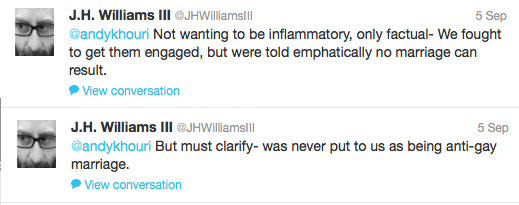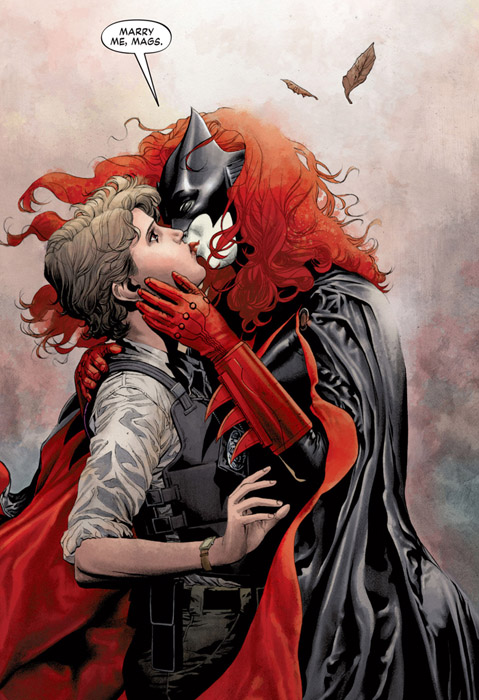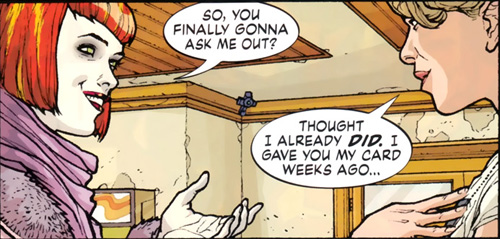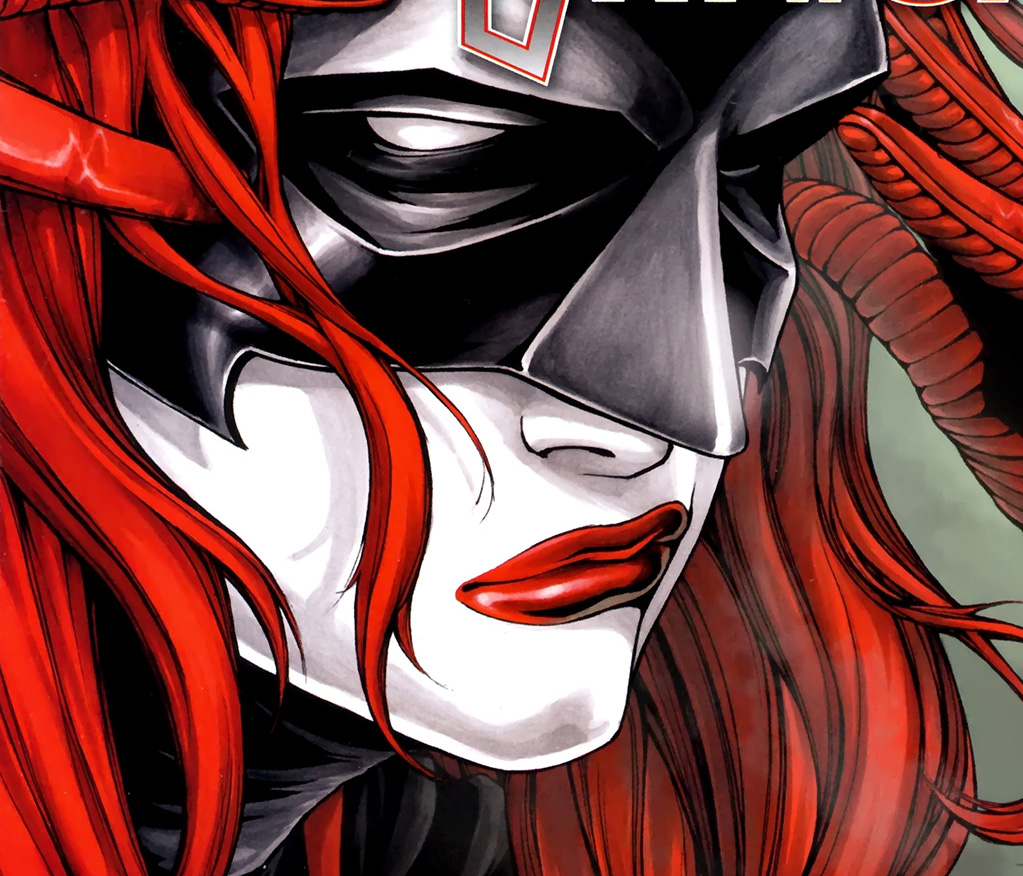By now, you’ve probably heard about DC’s rather public PR nightmares from last week. One involved Harley Quinn and a dubious-at-best decision by DC editorial regarding soliciting artwork for an upcoming book. The other revolved around marriage in the DC Universe; specifically it centered on Batwoman and her longtime girlfriend (and recent fiancée), Maggie Sawyer. Though it’s been talked about on several other sites already, I’d like to offer my thoughts on why the second issue is such a big deal – and why DC’s handling of it is being viewed in such negative light.
The frenzy over Batwoman began late last Wednesday, 4 September, when co-authors JH Williams III and W. Haden Blackman announced that they’d be leaving the book after issue #26, the planned end of the arc they’re currently writing (though, thanks to another decision by DC, they’ll be replaced after issue #24). You can read the entire post at Williams’ blog, but the core of their reasoning for leaving the book is as follows:
“Unfortunately, in recent months, DC has asked us to alter or completely discard many long-standing storylines in ways that we feel compromise the character and the series. We were told to ditch plans for Killer Croc’s origins; forced to drastically alter the original ending of our current arc, which would have defined Batwoman’s heroic future in bold new ways; and, most crushingly, prohibited from ever showing Kate and Maggie actually getting married. All of these editorial decisions came at the last minute, and always after a year or more of planning and plotting on our end.”
Somewhat predictably, the Internet latched onto the fact that Kate and Maggie, who got engaged in February’s Batwoman 17, would never be allowed to marry. Williams was quick to clarify that DC’s ban was on the “marriage” part, rather than the characters involved:

In order to understand why this is such a big deal, we have to look both at the character herself and the greater cultural context of what, exactly, DC is saying with their ban. For those of you unfamiliar with the character, let’s get a brief intro to Kate Kane:

Kate’s history is a little murky at this point, mainly because it’s not totally clear how much of her pre-reboot history stands and what has been thrown out. (Her character was introduced in 2006, so when the reboot happened, there wasn’t all that much to reboot.) What we know at this point is that she was thrown out of the military under the “Don’t Ask, Don’t Tell” policy; that she has been linked romantically to GCPD detective Renee Montoya and current fiancée, GCPD detective Maggie Sawyer; that she has tenuous relationships with her family members (it’s hinted that this is due to pre-reboot events); that she operates in Gotham as Batwoman, in an interesting position as both part of the Bat-family and someone who operates outside of Bruce’s controlm unlike its other members.
The Kane family is Gotham royalty, just as the Waynes are; in fact, Bruce’s mother Martha was a Kane before marrying Thomas Wayne, therefore making Bruce and Kate first cousins, though this isn’t a point that’s brought into the open all that often in canon (and may no longer be true since the reboot, but I have no evidence either way on that one). Kate, in her public role as heiress to the Kane fortune, is out of the closet and not timid about it in the least. Her life has, to a certain extent, been shaped by her sexual orientation; she was outed as gay, and was discharged from the military as a result, which understandably changed her plans for her own future. The writers have never shied away from Kate’s sexual orientation, and Kate has become the only leading LGBTQ* character in current comics. There are a small but growing number of other such characters, but Kate is the only one who is the star of her own eponymous book.

When Kate and Maggie’s engagement was announced earlier this year, some of the immediate response was a grumbling about how DC was trying to save face after the Alan Scott debacle of a few months earlier (DC hyped up the fact that they were going to make an iconic character gay, then chose to make it a character who is virtually unknown in mainstream media, only appears in one title, and whose partner was killed off two pages after being introduced). There were also people wondering if DC’s announcement was in response to the recent marriage of Kevin Keller and Clay Walker in Archie, or the wedding of Northstar and his partner Kyle in Astonishing X-Men. Several critics wondered if DC would give Maggie and Kate an almost shotgun-type wedding just so they could milk the publicity. DC kept its lips sealed on the matter, though, until last week’s announcement.
So why won’t DC let Kate and Maggie get married?
The official DC line is that they’re not against gay marriage in their universe, but against all marriage. In a panel at Baltimore Comic Con this past weekend, Dan DiDio, co-publisher of DC Comics, had the following to say:
“Heroes shouldn’t have happy personal lives. They are committed to being that person and committed to defending others at the sacrifice of their own personal interests. That’s very important and something we reinforced. People in the Bat family… their personal lives basically suck. Dick Grayson… Bruce Wayne, Tim Drake, Barbara Gordon, and Kathy [sic] Kane. It’s wonderful that they try to establish personal lives, but it’s equally important that they set them aside. That is our mandate, that is our edict, and that is our stand.”
Leaving aside the fact that Kathy Kane and Kate Kane are two different people (and that barring a possible resurrection in Batman Incorporated, Kathy Kane has been dead for years), this statement is shortsighted and more than a little offensive. The DC universe – indeed, comics in general – are a reflection of the real world. We might be lacking in super-powered men and woman who can fly around, or who build themselves super-suits with which to fight equally-powered villains, but that doesn’t mean that we don’t have heroes in our world. While I’m certain that DiDio’s comment was meant to apply to DC characters and those characters only, his phrasing makes it sound like our everyday heroes – our soldiers, police force, firefighters, doctors, and others – should devote themselves to their jobs at the expense of their personal lives. That’s what they do in the DC universe, after all, and if the DC universe is meant to mirror and further our own, then our universe should show those characteristics as well, right?
Another point to detract from this comment: I know that I, personally, read comics as a form of escapism. I want to read things that show me a world that isn’t my own; I like it when my heroes have lives outside of their uniforms. A lot of my favorite moments in comics have been the interpersonal ones (Roy Harper interacting with his daughter, Steph Brown teaching Damian Wayne how to be a kid, and the deep friendship between Conner Kent and Tim Drake, to name a few pre-reboot examples). Now we have a world where the heroes only ever get to win on the battlefield, a place where they return to empty, broken homes, a universe filled with martyrs to the cause who never catch a break – and that’s not something I’m interested in reading. I would far rather have them constantly losing in battle if it meant that they’d return home to their families and friends and get both reassurance and inspiration to go back and fight again. Why keep fighting if there’s nothing to fight for?
DiDio went on to reiterate that DC is against marriage in general, and that it isn’t specific to Kate and Maggie. It made waves when it was announced that Superman and Lois Lane were no longer going to be together, and since then, we’ve noticed that many other prominent DC couples are either no longer together or have been killed off (or simply not included in the reboot). One of the couples that had seemed to survive the edict, and the one that was brought up as an example, was Aquaman and his wife, Mera. DiDio replied that no, the two aren’t married in current continuity… but less than a minute’s worth of research proves him wrong. According to DC’s own website, Mera and Arthur are married. Knowing DC’s penchant for retconning, I screencapped the relevant bits on 12 September (highlighting mine):

Let’s put that aside for the moment. Let’s assume that the website is mistaken, and that there are no marriages in the current DC canon. Why is it a big deal that these two particular characters aren’t allowed to marry?
This goes back to what I said earlier about comics being a reflection of real life. Comics, and fiction in general, are a way for creators to show what the world would be like if something were different – if animals could talk, or if elves and dwarves were real, or if super-powered heroes were around to protect humanity. They can be an incredibly powerful catalyst for showing what change could be like. In this case, DC had a great opportunity to show what a universe where same-gender marriage is allowed could be like (which is to say, it could show how normal and non-universe-changing it is to let people of the same gender marry).
The flip side, though, is a lot darker. Again, looking back to what I said before: comics are a way for a lot of people to escape things that are bothering them about the real world. The good guys will eventually win the battle, even if the reader is never going to win in their fight with their boss. The hero is going to get better, even if the reader is chronically ill. The reader might not be able to marry their same-gender partner in the real world, due to laws that prohibit that, but at least they can open up a comic and see that a couple is allowed to marry in a different world. It brings hope for change and gives us something to believe in and strive for – but by not allowing Kate and Maggie to marry, by letting them get engaged but keeping them in a holding pattern, DC is showing us a real-world situation that a lot of people are in without resolving it in a hopeful manner. They’re showing a tacit acceptance of the status quo, instead of taking the opportunity to stand up for equal rights.

I’m not saying that DC should have given Kate and Maggie a fairytale wedding issue, nor that they should have a perfect happily-ever-after. I doubt that that’s what Williams and Blackman had planned for the characters, and if that’s what had been published, I would have objected to it, because the characters are written in a way that would lead to more head-butting than lovey-dovey walks in the park to feed ducks in the pond. I would have been fine with an understated wedding for the two of them, and I would expect them to struggle. Maybe they’d make it; maybe they wouldn’t. It’s not as though same-gender partners are any more or less likely to stay together than opposite-gender partners; in the end, people are people are people, and their sexual orientation doesn’t change that.
Whatever their original intentions may have been, DC made a huge misstep with Batwoman. I applaud JH Williams III and Haden Blackman for standing up for their story and their characters, and I can’t wait until April, when Williams will be at my local comic convention.
I want to shake his hand.
Batwoman: Hydrology. Written by W. Haden Blackman and JH Williams III; art by JH Williams III. Published 2013; collects Batwoman #0-5. Find it on Amazon or buy it from comixology.
Batwoman: To Drown The World. Written by W. Haden Blackman and JH Williams III; art by JH Williams III. Published 2013; collects Batwoman #6-11. Find it on Amazon or buy it from comixology.
Comments? Questions? Leave a reply! I’ll be happy to talk comics with you.

All the marriage hate is extremely weird. It’s not like there can’t be tension in marriage. Just because the writers failed to capitalize on it pre-New 52 doesn’t mean it can’t be done. What this lack of marriage does mean is that these comics slowly are able to speak to me less and less. And it’s the comics that really speak to you that you go out of your way to get – such as Saga which speaks to me as a new parent. (Well, the newness is fading, but that’s comic book time vs real life time)
Exactly this. I forget who it was that said it, but one of the reactions I saw to this whole thing was someone saying that the only boring marriage stories are written by boring writers. Marriage doesn’t automatically mean that the characters are always happy. Marriage takes a lot of work and compromise and sacrifice on the personal front, so DC’s avoidance of it altogether just doesn’t make sense even from their misguided “heroes shouldn’t be happy” POV – marriage isn’t an instant ray of sunshine.
Their ban on marriage is also partly from a refusal to let their characters age (which is supposedly also part of why they let Morrison kill Damian off – he was proof of Bruce getting older). This… is also something I find deeply ridiculous.
Indeed. You and I have often discussed how silly it is to refuse the characters the chance to age. Age brings its own set of conflicts, fears, and problems. It would allow things to stop being so stale without the current trend of retconning to reduce staleness. The real problem is that comics are a mature industry now. Fantastic Four was created as a last hurrah (as was Final Fantasy – the video game series). All of Marvel and DC’s characters didn’t exist at one point. But they’re afraid to introduce new ones and afraid to let the old ones die. (People have been saying similar things about the Final Fantasy series these 30-something years later)
I’m not familiar with Final Fantasy, but I definitely agree about the comics characters. It’s not that I want them to just kill off the current set and have a new generation take over, but at the same time, I think that pre-reboot Batman was brilliant. They had Bruce moving on, Dick taking over as Batman, and Damian as Robin, and it’s one of my all-time favorite runs. I loved the change, I loved that it showed how each of the characters had grown, and I loved the fresh take. The reboot’s reset to the status quo was really sad in a lot of ways, but I think I mourn the loss of the Dick and Damian pair the most.
Well… the most after losing characters like Steph and Cass, that is. 🙂 (It’s hard to pick something that I mourn the most about the reboot, sigh. Why can’t I just like Marvel more?)
It’s funny. From just the perspective of this one issue you’d probably like Marvel more. They tend to allow the characters to age (albeit very slowly) and as far as I know they don’t reset their universes. When they did, they just created a whole new line – Ultimate Comics.
Of course, they’re far from perfect. First of all, they still killed Spidey’s marriage to MJ. Second, unlike DC’s keep the number of books to 52 thing – Marvel has TONS of books. Before my daughter was born I was just following Fantastic Four and X-Men and I was spending like $150/month. That’s asking too much of your readers, I think.
I tend to favor the setup of the DC universe more – I like the idea of legacy characters and of “families,” so to speak. There are definitely some books I like in Marvel – I read Deadpool, Young Avengers, and Hawkeye almost religiously – but I’ve never been able to get into their team books. I love the Marvel movies, and they’re a big part of what drew me back to comics, but I cannot get into their books.
[…] So What’s With Batwoman?: Why This… […]